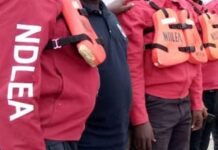
The Partnership for Maternal, Newborn and Child Health (PMNCH) an NGO, has underscored the need to protect vulnerable women, children, adolescents and the health workers in the Sahel region.
This is contained in a statement jointly signed by Ms Helen Clark, Board Chairperson of PMNCH and Kirsti Kaljulaid UN Secretary General’s Global Advocate for Every Woman Every Child on Wednesday in commemoration of the World Immunisation Week 2022.
The News Agency of Nigeria (NAN) reports that the theme for this year’s World Immunisation week is: ` Long Life for All ‘.
According to the statement, this year’s theme is in pursuit of a long life well lived, providing a timely reminder that delivering life-preserving vaccines against dangerous childhood diseases remains a global ambition yet to be achieved universally.
It said that the call to protect women, children, adolescents, health and aid workers who provide their care and support became necessary because they are facing growing challenges and life threatening risks in these times of escalating conflict and humanitarian crises worldwide.
It also urged leaders globally to commit to greater investment in safety and protection measures for health and aid workers who risk their lives striving to provide services, support and care to groups in the most challenging circumstances.
It added that health and aid workers also risked their security and lives trying to maintain service coverage, care and support for vulnerable women, children and adolescents in conflict settings.
The statement said that aid workers might become casualties of conflict, either as accidental victims of attacks or as deliberate targets of hostile forces.
It said violence against aid workers claimed 484 individual victims in 2020, 117 of whom died, making 2020 the worst year on record for the second year in succession.
“To protect those who protect us, there is an urgent need for targeted co-ordination of investments to promote safe service access, including delivery of vaccines and other essential services and commodities through multi-level and multi-sectoral private-public efforts.
“If health workers are to provide vaccines and other essential services in these settings they require constant protection, as urged by the UN Security Council (Resolution 2286) and mandated by international humanitarian and human rights laws.
“The international community should hold states and armed groups accountable for upholding international humanitarian law in the territories they control,” it said.
It said that in periods of conflict and in challenging humanitarian settings, even the most basic health entitlements from accessing safe midwifery services to routine childhood vaccinations could be denied to vulnerable women, children and adolescents who need them.
The statement added that if an armed conflict occurred within 10 kilometres from where a child resides, the odds that a child would receive any vaccination was 47.2 per cent lower.
“Of the 8.4 million people in the North Eastern states of Nigeria: Borno, Adamawa and Yobe (BAY states) that are estimated to need humanitarian aid in 2022, more than 30 per cent of households report barriers to accessing essential health services.
“North Eastern Nigeria also has lower vaccination rates compared to other parts of Nigeria: 42 per cent of children in the Northeast have never received any vaccination, while this is true of only eight per cent in the Southeast (National Immunization Coverage Survey, 2016/2017).
“As a result, many children die from vaccine preventable and other infectious diseases like malaria, acute watery diarrhea, cholera and measles. ‘’they said
It said that in chaotic and desperate situations caused by conflicts, in distressing humanitarian contexts, health and aid workers were key players in the protection and assistance system.
This, the statement said was because their intervention nurtures the hope of the right to health and well-being among victims and affected populations.
“The harms and losses caused to health and aid workers in conflict zones call for multisectoral and equitable response.
“ It is time to act to protect those who protect the health and well-being of women, children and adolescents, even in perilous security contexts.
”It is time for all actors involved in the humanitarian field to take concrete and innovative actions so that health and aid workers no longer suffer damage, no longer lose their lives while carrying out their mission.
“The impact of conflict and humanitarian crises on women, children and adolescents and the health care workers who risk their own lives protecting others will be further explored in a forthcoming virtual summit hosted by PMNCH, the world’s largest alliance for women’s, children’s and adolescents’ health,‘’ it said.
The statement said that the summit with the theme: “Lives in the Balance: Delivering on Commitments in Humanitarian and Fragile Settings” which would hold on May 19, would bring together representation from governments, private sector and non-governmental organisations.
Others are: academic institutions, health professional associations, youth-led organisations and grass-roots campaign groups to explore what formed a global response to these challenges should take. (NAN)



